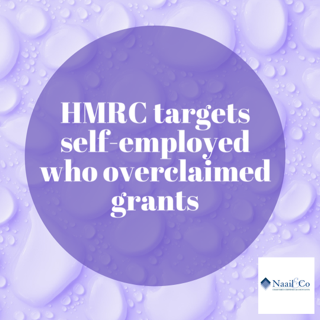HMRC targets self employed who overclaimed grants
HMRC is targeting self-employed workers who overclaimed coronavirus grants during the pandemic.
The self-employed income support plan provided subsidies to self-employed people and members of partnerships who had been negatively affected by the coronavirus pandemic (SEISS). To be eligible for the grants, a company’s taxable profits must not have exceeded £50,000 in 2019/20 or 2020/21, or the estimated average from 2016/17 to 2019/20. A turnover test was also performed.
There were five grants total, with the first one beginning in July 2020 and the last one ending on September 30, 2021. Except for the second award, which was capped at £6,750, the maximum amount was £7,500. The grants are taxable and subject to National Insurance contributions in the years of receipt (2020/21 or 2021/22).
‘Business owners whose entitlement to the fourth and fifth grants has been reduced by more than £100 have started getting assessments to collect the overpaid sums,’ said Eugenia Campbell, director, private client tax at RSM. Repayments shall be made within 30 days of the date of the evaluation. There is a late payment penalty of 5% of the overpayment amount. For payments unpaid six months and twelve months after the due date, additional late payment penalties will be imposed. This comes at an unfortunate time for individuals who are already experiencing inflationary pressures.
Amounts may be excessive because the claimant modified one of their tax returns for the years 6 April 2016 to 5 April 2020 on or after March 2021; or the claimant’s predicted turnover numbers for the fifth claim were lower than the actual amount shown on the claimant’s tax return.
Businesses, on the other hand, may have suffered trading losses during difficult times. These can be used to generate cash savings in a variety of ways for unincorporated enterprises that fulfil in various ways:
- offset against the individual’s total income in the current tax year;
- carried back to utilize against total income of the previous tax year;
- carried forward to use against profits of the same trade in future years;
- if the business ceases, any terminal losses can be used against profits of the year of cessation and the three preceding tax years.
A change in accounting date, if necessary, could speed up the utilisation of current-year losses.
For eligible plant and machinery, annual investment allowances (AIA), a sort of capital allowance, can be claimed.
‘Most taxpayers would have filed an SEISS claim in good faith,’ Campbell said, given on the information available at the time. ‘Extending the payback deadline to coincide with the filing of tax returns on January 31, 2023 would be a welcome relief from escalating costs.’ However, taking advantage of any tax breaks can also help.’

Our service to you
If you are a self employed, business owner/director of company looking to get your accountancy and taxation matters sorted, look no further. We, at Naail & Co, are pro-active and easily accessible accountants and tax advisors, who will not only ensure that all your filing obligations are up to date with Companies House and HMRC, but also you do not pay a penny more in taxes than you have to. We work on a fixed fee basis and provide same day response to all your phone and email enquiries. We will also allocate a designated accounts manager who would have better understanding of your and business financial and taxation affairs. Book a free consultation call using the link below.
Related pages:
Get further information from the following pages;
Related Blogs:
Get further information from the following blogs;
HMRC chases 4,000 taxi drivers
Don’t get caught by 60% income tax rate
Late tax payment interest rate raised to 2.75%
Covid grants to be included in tax returns
HMRC help towards childcare cost
Covid loans used to buy houses and cars
Fraudulent Covid loans of £4.9bn
Subscribe to our newsletter
BUSINESS HOURS
Monday – Friday
- 9:00 am – 5:30 pm
Pages:
Menu








